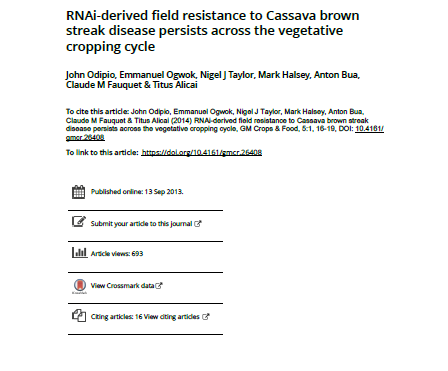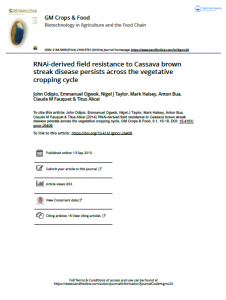A confined field trial was established to determine durability of RNAi-mediated resistance to cassava brown streak disease (CBSD). Stem cuttings were obtained from field-grown cassava plants of cv 60444 transgenic for construct p718, consisting of an 894 bp inverted repeat sequence from the Ugandan Cassava brown streak virus (UCBSV) coat protein. Plants were established from three transgenic lines previously shown to provide complete resistance to UCBSV and differing levels of protection to the non-homologous virus species Cassava brown streak virus (CBSV), and grown for 11 months. CBSD symptoms were observed on shoots and storage roots of all non-transgenic cv 60444 control plants and transgenic lines p718–002 and p718–005, but not on p718–001. RT-PCR diagnostic showed tissues of plant lines p718–002 and p718–005 to be infected with CBSV, but free of UCBSV. All leaves and roots of p718–001 plants were to carry no detectable levels of either pathogen. Plants of cv 60444 in this field trial showed severe cassava mosaic disease symptoms, indicating that presence of replicating geminiviruses did not cause significant suppression of RNAi-mediated resistance to CBSD. Resistance to CBSD across a vegetative cropping cycle confirms earlier field data, and provides an important step in proof of concept for application of RNAi technology to control of CBSD under conditions encountered in farmers’ fields.
Region: Uganda
Date published:
2013
Published by:
GM Crops & Food
Type of resource:
Journal article
Resource topic:
Cassava
Project/Programme: Not specific
Pest/Disease: Cassava brown streak virus
Pages:
5
File type:
External link (920 KB)




